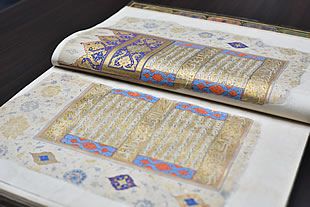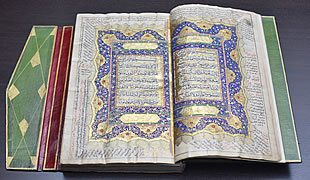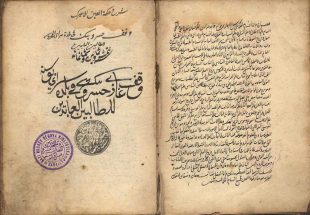Manuscript fund
In the manuscript fund of Gazi Husrev-bey Library there is a total of 10.585 codices of manuscripts, including 16.907 works in Arabic, Turkish, Persian, and Bosnian languages. Manuscripts originating from different parts of Islamic world, were created between 12th and 20th century.
Out of them, 60 percent are in Arabic, around 30 percent in Turkish, and the rest in Persian and Bosnian (written in Arebica). Although many of these manuscripts originate from major Islamic canters like Mecca, Medina, Cairo, Bagdad, Damascus, Istanbul and other places, there is a significant number of manuscripts (written or copied) originating from Bosnia and Herzegovina; not just from larger towns but from minor places as well.
As for the topics, the fund contains works of general and encyclopedic character, manuscripts of the Qur’an, Islamic scientific works, hadith, akhaid, fikh, as well as linguistics and literature, history, geography, medicine, veterinary science, mathematics, astronomy, astrology and other sciences. A significant number of these manuscripts are unique or rare copies, such as autographs, copies written in the 12th, 13th or 14th century, manuscripts copied during the author’s lifetime or immediately after his death, manuscripts unique with their calligraphically, illuminations, unvan, manuscripts with specially made leather binding decorated with ornaments and manuscripts that stand out with some other characteristics.
The oldest manuscript in the Gazi Husrev-bey Library is the fourth volume of the famous theological and mystical work by Abu Hamid Muhammad ibn Muhammad al-Ghazali (died 1111) copied on the 1st of jumade-l-evvela 500/1106, which means during the author’s life. The second oldest manuscripts are the manuscript of the same work from 1131, a codex of Firdevs el-ahbar hadiths from 1151, and a commentary on the Qur’an Kitab el-keshf ve el-bejan by Ebu Ishak en-Nisaburi from 1176. Close to 300 manuscripts from this collection where written before 1500. Among these manuscripts are those which, with their decorations, ornaments, and artistic impressions, can be counted as masterpieces and unique works of oriental calligraphy. In the first place, those are the ajza of Mehmed-pasha Sokolović, Mushaf of Fadil-pasha Šerifović, Hafiz’s divan songs with portrait miniatures, Jami’s collection of songs Tuhfe el-ahrar, and dozens of luxuriously decorated mushafs, collections of prayers, and divan poetry in Turkish and Persian languages.
Taking into consideration that since its foundation in 1537, the Gazi Husrev-bey Library has shared the fate of Sarajevo which had been hit by numerous disasters (floods, fires, and wars), only a couple of manuscripts from its original fund with a seal by Gazi Husrev-bey himself have been saved. Nevertheless, the manuscript fund over the last 150 years has been constantly expanding. This fact is due to the inflow of manuscripts from other libraries, including those by Osman Šehdija and Abdulah Kantamirija from Sarajevo, Hajji Mehmed Karagoz-bey from Mostar, Elči Ibrahim-pasha from Travnik, Hajji Halil-effendi from Gračanice, Hasan Nazir from Foča, Đumišić madrasah from Sarajevo, Ibrahim-pasha madrasah from Počitelj; many private libraries and family collections of: Hasan Bojić, Ahmed Mutevelić, Mustaj-bey Dženetić, families Džinić, Muzaferija, Hromić, Saračević and Kasumagić, as well as the libraries of Muhamed Enveri Kadić, Mehmed Handžić, Hilmija Hatibović, Osman Asaf Sokolović, Muhamed Hadžijahić, and many others. The most recent contributions are made by the Čaršimamović and Đumišić families. All these manuscripts, as well as many others that came to this collection through trade or as a gift, made the manuscript collection of Gazi Husrev-bey Library today the richest collection of manuscripts in the Balkans in terms of number, content and variety.
The manuscripts of the Library also include the works by authors born in Bosnia and Herzegovina such as Alaudin Ali Dede Mostari (died 1598), Ahmed Sudi (died after 1598), Derviš-pasha Bajezidagić (died 1603), Hasan Kafi Akhisari (died 1616), Muhamed Nerkesi (died 1635), Muhamed Musić Allamek (died 1636), Shaykh al Islam Mustafa Bali-zade (died around 1663), Ahmed Bejazić (died 1686), Mustafa Ejubović, called Šejh Jujo (died 1707), Ibrahim Opijač (died around 1725), Ahmed ibn Mustafa Mostari (died 1776) and many others.
So far, 10.190 manuscripts have been catalogued into eighteen volumes of catalogues. All manuscripts in the Gazi Husrev-bey Library have been copied on micro films and digitalized, and metadata are available electronically.




